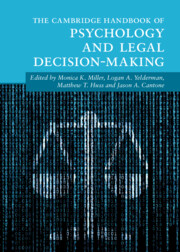Book contents
- The Cambridge Handbook of Psychology and Legal Decision-Making
- Cambridge Handbooks in Psychology
- The Cambridge Handbook of Psychology and Legal Decision-Making
- Copyright page
- Dedication
- Contents
- Figures
- Tables
- Editors
- Contributors
- Part I Introduction Chapters
- Part II Pretrial Phase Decision-Making
- Part III Trial Phase Decision-Making
- Part IV Postconviction Phase Decisions
- Part V Other Legal Decision-Making
- 34 Decision-Making in Immigration Court
- 35 Evaluation Decisions by Psychologists about Causation and Damages in Personal Injury and Employment Discrimination Cases
- 36 Factors Influencing the Decision to Commit White-Collar Crime
- 37 Tort Law Decision-Making
- 38 Judicial Decision-Making in Juvenile Dependency and Juvenile Justice Cases
- 39 Legislative Decision-Making
- 40 Decision-Making in Alternative Dispute Resolution
- 41 Criminal Decision-Making
- 42 Social Worker Decision-Making
- 43 Decision-Making in Civil Matters
- Part VI Perspectives from the Field
- Part VII Conclusion
- Index
- References
41 - Criminal Decision-Making
from Part V - Other Legal Decision-Making
Published online by Cambridge University Press: 22 February 2024
- The Cambridge Handbook of Psychology and Legal Decision-Making
- Cambridge Handbooks in Psychology
- The Cambridge Handbook of Psychology and Legal Decision-Making
- Copyright page
- Dedication
- Contents
- Figures
- Tables
- Editors
- Contributors
- Part I Introduction Chapters
- Part II Pretrial Phase Decision-Making
- Part III Trial Phase Decision-Making
- Part IV Postconviction Phase Decisions
- Part V Other Legal Decision-Making
- 34 Decision-Making in Immigration Court
- 35 Evaluation Decisions by Psychologists about Causation and Damages in Personal Injury and Employment Discrimination Cases
- 36 Factors Influencing the Decision to Commit White-Collar Crime
- 37 Tort Law Decision-Making
- 38 Judicial Decision-Making in Juvenile Dependency and Juvenile Justice Cases
- 39 Legislative Decision-Making
- 40 Decision-Making in Alternative Dispute Resolution
- 41 Criminal Decision-Making
- 42 Social Worker Decision-Making
- 43 Decision-Making in Civil Matters
- Part VI Perspectives from the Field
- Part VII Conclusion
- Index
- References
Summary
People undertake a decision-making process when they perceive a criminal opportunity although these decisions are often not purely rational. To clarify this process, several theories have been developed to explain how criminal decisions are made. Three such theories – deterrence theory, rational choice theory, and routine activity theory – along with major concepts from each theory, are examined in this chapter. Among the topics covered are the celerity, certainty, and severity of punishment, the utility of cost–benefit analysis, and the necessity of considering the role of a motivated offender, a suitable target, and the absence of capable guardians in explaining a criminal event. The limitations of a purely rational approach to criminal decision-making and how opportunity, incentive, emotion, and irrational thinking affect these decisions are also discussed. Finally, the practical and policy implications of these results are explored, after which recommendations for future research focusing on the methodology and domains that influence these decisions are made.
Keywords
- Type
- Chapter
- Information
- The Cambridge Handbook of Psychology and Legal Decision-Making , pp. 634 - 646Publisher: Cambridge University PressPrint publication year: 2024

